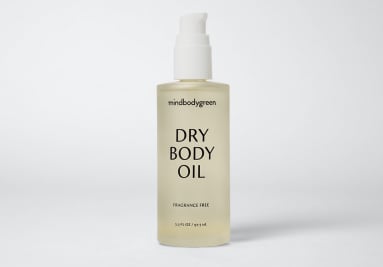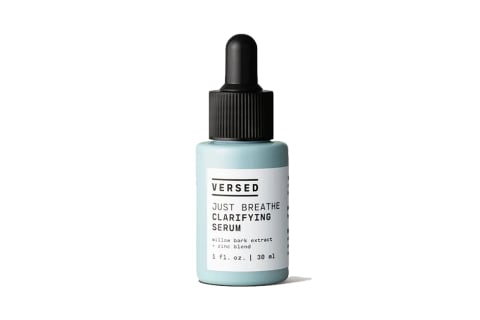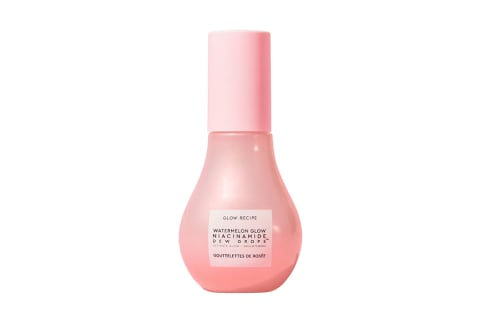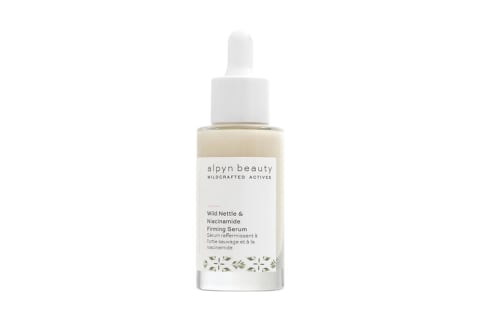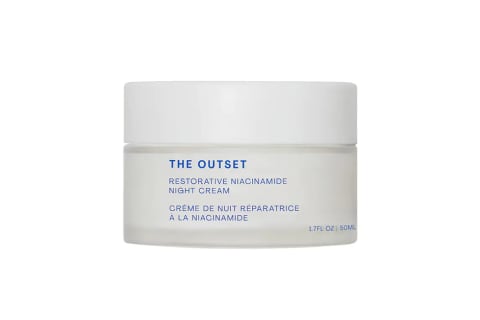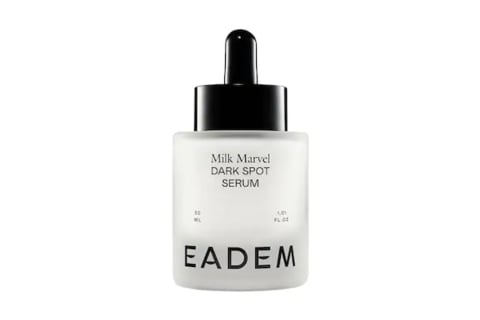What Does Niacinamide Do? 7 Benefits, Tips From Top Derms & Our Favorite Products

Niacinamide is one of those ingredients that has been used forever but has gotten much more notoriety in recent years. Given the loads of clinical research demonstrating its effectiveness for skin brightening, hydration, and even healthy skin aging, it's really no surprise.
But there are a few important things to note about this buzzy ingredient, so keep reading to learn more and find out if it's right for you.
Advertisement
What is niacinamide?
Niacinamide is a powerful form of vitamin B. "This powerhouse ingredient contributes to the support of the skin against pollutants and other irritants," board-certified dermatologist and creator of clean skin care brand Goldfaden M.D. Gary Goldfaden, M.D., FAAD, tells mbg.
Here's how it works: "Niacinamide Increases production of ceramides and fatty acids, two key components of the skin's outer protective barrier," Goldfaden explains.
In skin care formulas, you can find niacinamide in two forms: nicotinic acid (also known as niacin) and nicotinamide (also called niacinamide), Goldfaden says.
The latter, niacinamide, is an essential element in the creation of two important enzymes called NADH and NADPH, both of which play a central role in cellular energy production and the formation of skin lipids, he adds.
The bad news is that these enzymes naturally decline with age. However, "The good news is that topical application of niacinamide helps preserve these valuable enzymes that defend your skin against many of the common factors that accelerate aging," Goldfaden says.
Summary
Advertisement
Benefits of niacinamide for skin
All of this to say: Niacinamide is an essential vitamin that contributes to overall skin health. There are a few more specific benefits that have been extensively researched, so let's dive deeper:
Hydrates
As Goldfaden mentioned above, niacinamide increases the production of ceramides and fatty acids in the skin. These two are incredibly significant players in overall skin hydration.
In fact, without ceramides, your skin barrier will become compromised. "Skin with inadequate skin barrier functions like eczema and atopic dermatitis have low levels of ceramides in the skin," clean cosmetic chemist Krupa Koestline once told mbg.
Advertisement
Regulates oil production
In one study, 2% topical niacinamide was shown to reduce sebum production1—one factor that contributes to clogged pores and breakouts.
What's more, one study showed that applying a topical formula of 4% niacinamide treated moderate acne just as well as 1% of the topical antibiotic clindamycin. While niacinamide alone likely won't reduce chronic breakouts (like cystic acne, for example), it is an excellent addition to any routine for acne-prone skin.
Given the hydrating properties of niacinamide, this is one ingredient that serves as an A+ remedy for those with dry or sensitive skin who also experience breakouts, as other astringent products formulated for acne-prone skin may contribute to more dryness and irritation.
Decreases inflammation
Goldfaden notes that niacinamide (and nicotinamide) also has anti-inflammatory properties. This is why niacinamide is a great option for inflammatory skin conditions such as eczema and breakouts.
Board-certified dermatologist Hadley King, M.D., calls niacinamide a "great multitasking ingredient," especially for those looking to calm the skin and improve its appearance without irritation.
Advertisement
Supports the barrier
Goldfaden notes that niacinamide can be particularly effective for maintaining a healthy skin barrier. As this comprehensive study2 states, "Increasing barrier function may result in less irritation when the skin encounters environmental insults," which can lead to a decrease in redness.
But supporting the skin barrier is not just about aesthetics: "It protects us from mechanical injury, low humidity, cold, heat, sun, wind, chemical exposure, bacteria, viruses, fungi, and other viruses," King previously mentioned.
Antioxidant support
While vitamin C may be the buzziest antioxidant, it's certainly not the only one. Niacinamide may not be known for being a powerful antioxidant, but studies show it can increase the production of NADP3, which does have essential antioxidant properties.
And because niacinamide decreases transepidermal water loss (TEWL), it also increases your skin's protection against harmful topical agents and environmental stressors.
Advertisement
Hyperpigmentation & melasma
King notes that niacinamide can also help with hyperpigmentation. As this study demonstrates, niacinamide inhibits melanosome transfer4, resulting in brighter skin and reduced appearance of dark spots after four weeks of consistent use.
Hyperpigmentation can be difficult to treat, especially for those with sensitive skin who can't tolerate potent retinoids or skin-brightening agents. Plus, those with melanin-rich skin may experience irritation and increased hyperpigmentation from strong exfoliants—which is why niacinamide is a common ingredient in skin care products formulated for melanin-rich skin.
Even more, niacinamide has been proven effective in treating melasma. In this double-blind study5, niacinamide was comparably effective as hydroquinone (another skin-brightening agent) with fewer negative side effects.
Smooth texture & fine lines
In one 2021 review6 of this powerhouse ingredient, research showed an improvement in skin texture and ease in the appearance of fine lines. This is important to note as classic exfoliants like AHAs, BHAs, and retinol can significantly improve texture and contribute to healthy skin aging, but they shouldn't be used every day.
However, niacinamide can be. So, if you're prone to consistent texture on the skin, consider adding a niacinamide serum to your routine—don't worry, our top-pick products are listed below.
RELATED: The 12 Best Niacinamide Serums Of 2023 For Glowing Skin
How to use niacinamide
Another lovely thing about niacinamide is that it's already found in so many products. You can opt for a face cream, serum, or hydrating essence. The important thing is to know how much niacinamide you're getting in these products.
To make the process a bit easier, opt for a niacinamide serum for the sake of efficacy. In the research studies noted above, 2% to 4% niacinamide was most often used and proven effective. While there are certainly products out there with a higher concentration, it's not essential to reap the benefits—in fact, higher doses may even be irritating (more on that next).
How to use it in your routine:
As with all skin care, how to use it comes down to layering. Luckily the ingredient plays well with others, but you should still be mindful of how it's used in your routine.
- Cleanser
- Toner or essence (optional)
- Serum. Here you can use a niacinimide serum if you choose. You can also use another type of serum (such as an antioxidant or hydrating serum) and save your niacinimide for the next step.
- Face lotion or cream. The ingredient is often formulated alongside others as a moisturizer. This is an excellent option if you want to use it at lower concentrations.
- Oil or sunscreen
Cautions
As with many skin care products, more does not always mean better—and niacinamide is one perfect example of this. "Niacinamide topically can cause stinging, burning, or flushing to the skin in some patients," board-certified dermatologist Caren Campbell, M.D., previously told mbg. "Because it speeds skin cell turnover, some might experience peeling or flaking," she added.
So stick with a 2% to 4% niacinamide product, or use it every other day if you're opting for a more potent formula. As for general face creams containing niacinamide, you likely won't get more than 2% in those multi-ingredient formulas.
Niacinamide is also a safe ingredient to mix with other actives such as AHAs, BHAs, retinol, and even vitamin C. Translation: You can use your niacinamide serum in the mornings and evenings. Plus, with the ability to manage sebum production while providing hydration, niacinamide can be a year-round skin care staple.
RELATED: Vitamin B3 In Skin Care: 5 Benefits To Using A Niacinamide Serum
Is it right for everyone?
King notes that just about anyone can benefit from a niacinamide serum, given it can help with acne, skin aging, brightening, and even texture—all the while being a safe option for sensitive skin. As with any ingredient, be sure to do a patch test before you commit to using the product every day.
Our picks for the best niacinamide products
FAQ
Can you use niacinamide every day?
Yes, niacinamide is safe to use every day, Goldfaden says. "Given its excellent safety profile, outstanding stability, and well-documented therapeutic effects (which also include antioxidant and anti-inflammatory benefits), niacinamide is highly recommended as a powerful anti-aging ingredient and as an effective remedy for acne-prone skin as well," he adds.
What is better, vitamin C or niacinamide?
Many people ask whether niacinamide or vitamin C is better for skin brightening purposes. Here's what Goldfaden says: "In an ideal regimen one would us both vitamins." So if a brighter complexion is your goal, there's no need to pick one or the other—instead, look for a blend of the two given they work in different ways toward a similar goal. However, for those who cannot tolerate vitamin C topically, niacinamide is a great alternative.
What is better, hyaluronic acid or niacinamide?
"Niacinamide increases production of ceramides and fatty acids, two key components of the skin's outer protective barrier," Goldfaden explains. On the other hand, hyaluronic acid helps pull water into the skin. Using both together is the best practice for optimal skin hydration.
The takeaway
As you can see, niacinamide is a winner when it comes to all kinds of skin concerns, whether it be brightening your complexion, managing oil production, or easing fine lines. Stick with 2% niacinamide, as higher potency products can be irritating on the skin. Ready to add a niacinamide serum to your routine? Here's a curated list of our 12 favorite picks to get you started.
RELATED: The Best Organic Skin Care According To Your Skin Type

Hannah Frye is the Assistant Beauty Editor at mindbodygreen. She has a B.S. in journalism and a minor in women’s, gender, and queer studies from California Polytechnic State University, San Luis Obispo. Hannah has written across lifestyle sections including health, wellness, sustainability, personal development, and more. She previously interned for Almost 30, a top-rated health and wellness podcast. In her current role, Hannah reports on the latest beauty trends, holistic skincare approaches, must-have makeup products, and inclusivity in the beauty industry. She currently lives in New York City.
6 Sources
- https://www.tandfonline.com/doi/abs/10.1080/14764170600717704?journalCode=ijcl20
- https://www.ncbi.nlm.nih.gov/pmc/articles/PMC2921764/
- https://www.ncbi.nlm.nih.gov/pmc/articles/PMC2921764/#:~:text=Niacinamide%20increases%20the%20reduced%20forms,which%20have%20potent%20antioxidant%20properties.&text=Evidenced%20by%20reduced%20TEWL%20and,to%20potential%20harmful%20topical%20agents.
- https://pubmed.ncbi.nlm.nih.gov/12100180/
- https://pubmed.ncbi.nlm.nih.gov/21822427/
- https://www.ncbi.nlm.nih.gov/pmc/articles/PMC8389214/
